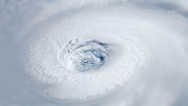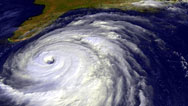STRONGER HURRICANES
PBS Airdate: January 10, 2006
After Hurricane Katrina a lot of folks were thinking about our planet and
were asking, "Are killer storms on Earth becoming more frequent? And if they
are, why?" We've always known that hurricanes on our planet come in cycles, but
reporter Chad Cohen looked back at the past season and wondered if maybe
there's something else going on here.
CHAD COHEN (Correspondent): You're looking into the eye
of the most intense Atlantic storm ever measured. It's not Katrina, the
hurricane that devastated New Orleans. It's Wilma, the third Category 5 storm
to form in the Atlantic in the 2005 season. Wilma set a new record, suggesting
that more intense hurricanes may be in store.
And if there's a reason why, it's out here. Research ships like this one,
run by N.O.A.A., take the ocean's temperature every three hours, 24 hours a
day. As the crew reels in this elaborate probe, they bring back evidence that
the oceans are heating up.
These numbers have presented us with one inescapable fact, the surface
temperatures of the world's oceans has gone up a half degree Celsius in just
the last 35 years. And there's nothing hurricanes like more than warm water.
The more warm seawater a storm can churn into vapor, the more heat is released
into the upper atmosphere. That lowers the pressure and causes winds at the
ocean surface to spiral inward and pick up speed. And some scientists, like
M.I.T. atmospherics professor Kerry Emanuel, believe that the rise in ocean
temperatures is the result of global warming, the heating of the Earth caused
by human activity.
Can we say for sure that we're causing that warming?
KERRY EMANUEL (Massachusetts Institute of Technology): The last
few decades, the temperature has gone up so quickly and so far out of what
we've seen in the last thousand years or so, that virtually everybody in the
business now believes we're seeing a manmade signal in the global
temperatures.
CHAD COHEN: And we know that hurricanes like warm water. So
it's very easy to just kind of say, "There it is. We're causing
hurricanes."
KERRY EMANUEL: We can't say we're causing more hurricanes.
CHAD COHEN: We can't say we're causing more hurricanes,
because the total number of hurricanes worldwide hasn't changed at all. For
reasons no one can explain, it always seems to hover right around 90 per year.
So if global warming hasn't caused more hurricanes, has it made them
stronger?
To find out, Kerry Emanuel took advantage of five decades worth of data
collected by aircraft flying directly into the paths of hurricanes. He
concluded that over this time, the average strength and duration of hurricanes
in the tropical regions of both the Atlantic and Pacific oceans has doubled.
But even more sobering is how closely this increase in storm power matches the
rise in ocean temperature.
It's pretty striking, actually. You look at the graph and the sea surface
temperatures go up like this, and the intensity of hurricanes goes up, it
follows perfectly.
KERRY EMANUEL: Yes, that's right. I think you can say, fairly
unequivocally, that half a degree rise in ocean temperature will cause
hurricanes to be more intense.
PETER WEBSTER (Georgia Institute of Technology): This is the
equator, here.
CHAD COHEN: At Georgia Tech, Peter Webster examined a
completely different set of hurricane measurements, 30 years of global
satellite observations. His conclusions mirror those of Kerry Emanuel's.
PETER WEBSTER: We find a consistency between the increase of surface
temperature in all of the oceans and a change in intensity to more intense
storms.
CHAD COHEN: But while both scientists agree that warmer oceans
have contributed to more intense storms, they caution that formation of
hurricanes is complex, to say the least, and involves many other factors,
including just plain chance.
KERRY EMANUEL: Hurricanes are like any phenomenon in the atmosphere,
creatures of chance. If you're interested in any given storm, it is the roll of
the die. And the whole question is whether that die is weighted.
CHAD COHEN: The problem with hurricanes is that we can never
say for sure what exactly happens. There's always an element of chance. So we
take the temperature of the water, measure the amount of moisture in the
atmosphere, we look at what the winds are doing, and depending on how all those
factors come together, we get a probability that a hurricane will become either
a Category 1, a 2, a Category 3, 4 or 5.
KERRY EMANUEL: I think there's little doubt that we are loading the die.
We're causing global warming. The tropical temperatures are going up.
CHAD COHEN: But whether global warming is having an impact on
hurricanes, well, not every scientist agrees, even those on the front lines of
storm forecasting.
CHRIS LANDSEA (National Hurricane Center): A hurricane was
predicted to come ashore.
CHAD COHEN: Last October, as Hurricane Wilma was poised to hit
Florida, Chris Landsea, at the National Hurricane Center in Miami, helped track
the powerful storm.
CHRIS LANDSEA: There's distinct cycles of hurricane activity in the
Atlantic, that it tends to go 25 or 40 years very busy, and 25 to 40 years
fairly quiet.
KERRY EMANUEL: If all we had to go on was the hurricane data, I don't
think we would be terribly alarmed. We'd just say, well, there...you know, it's
been changing the last 25, 30 years, so what? It's the correlation with sea
surface temperature and the fact that that trend is unprecedented for a long
time that has us worried.
CHRIS LANDSEA: We're not seeing unprecedented. We're seeing the same
type of hurricane activity that we saw in the middle part of the 20th century.
And it actually may have been busier back then, than it is now.
KERRY EMANUEL: A lot of things in science, sometimes there isn't a
smoking gun. There isn't one piece of evidence that everybody looks at and
says, "Yeah, you know, that proves that global warming is affecting
hurricanes." What you have are multiple pieces of evidence which all point in
the same direction.
CHAD COHEN: This high stakes debate will only be resolved with
more data, and that won't be a problem. Hurricane season is never too far
away.
Stronger Hurricanes
- Executive Producer
- Samuel Fine
- Executive Editor
- Robert Krulwich
- Senior Series Producer
- Vincent Liota
- Senior Producer
- Robe Imbriano
- Producers
- Julia Cort
Carla Denly
Robe Imbriano
Dean Irwin
Vincent Liota
Mary Robertson
Win Rosenfeld
- Editors
- Ben Ehrlich
Nathan Hendrie
Robe Imbriano
Vincent Liota
Win Rosenfeld
- Supervising Producer
-
Andrea Cross
- Development Producer
- Kyla Dunn
- Program Editor
- Steve Trevisan
- Associate Producers
-
Anthony Manupelli
Mary Robertson
Win Rosenfeld
Ayo Babatunde
Shimona Shahi
- Unit Manager
- Candace White
- Production Secretary
- Ayo Babatunde
- Compositing
- Yunsik Noh
- Production Assistant
- Robbie Gemmel
- Music
- Rob Morsberger
- NOVA scienceNOW Series Animation
- Edgeworx
- Camera
- Chris Borghesani
George Delgado
Brian Dowley
Tom Fahey
Vikram Gandhi
Robert Hanna
Michael Hunkley
- Sound Recordists
- Paul Austin
Vikram Gandhi
Mike Karas
Dennis McCarthy
Gilles Morin
Alex Sullivan
- Audio Mix
- John Jenkins
- Animation
- Mitch Butler
Edgeworx
Picket Design
Pie Design
- Special Thanks
- Clifford Cunningham
Foxwoods Resort Casino
The Graduate Center at CUNY
Alex Meissner
Naturally
Tasty Health Food
The New York Number Theory Seminar
The officers and crew of the NOAA ships Delaware II and Albatross IV
Jí¡nos Pintz
Salon Mario Russo
Cem Yildirim
Adam Zoghlin
- Archival Material
- ABC News Video Source
Art. Lebedev Studio
Mike Brown, Caltech
Michael Brumlik
Jewel Webb Chambers
CNN
CORBIS Motion
Michael DiGiorgio, Worldwide Nature Artists Group
Denis Finnin, American Museum of Natural History
Richard Gibbe
Dennis Kunkel Microscopy, Inc.
Robert Hurt (IPAC)
Jupiterimages Corporation
The Macaulay Library at the Cornell Lab of Ornithology
MODIS Rapid Response Project at NASA/GSF
Museum of Comparative Zoology, Harvard University
NASA/JPL
NASA/JPL-Caltech
Jay Pitocchelli
Prairie Pictures / StormStock, Martin Lisius
24 Images
N. John Schmitt
Ultimate
Chase Stock Video
Mitch Waite
WWL-TV
- NOVA Series Graphics
- yU + co.
- NOVA Theme Music
- Walter
Werzowa
John Luker
Musikvergnuegen, Inc.
- Additional NOVA Theme Music
- Ray Loring
- Post Production Online Editor
- Spencer
Gentry
- Closed Captioning
- The Caption Center
- NOVA Administrator
- Dara Bourne
- Publicity
- Eileen Campion
Olivia Wong
-
Senior Researcher
- Barbara Moran
- Production Coordinator
- Linda
Callahan
- Unit Managers
- Lola
Norman-Salako
Carla Raimer
- Paralegal
- Richard Parr
- Legal Counsel
- Susan
Rosen Shishko
- Post Production Assistant
- Alex Kreuter
- Associate Producer, Post Production
- Patrick Carey
- Post Production Supervisor
- Regina
O'Toole
- Post Production Editor
- Rebecca
Nieto
- Post Production Manager
- Nathan Gunner
- Supervising Producer
- Stephen
Sweigart
- Producer, Special Projects
- Susanne Simpson
- Coordinating Producer
- Laurie
Cahalane
- Senior Science Editor
- Evan
Hadingham
- Senior Series Producer
- Melanie
Wallace
- Managing Director
- Alan Ritsko
- Senior Executive Producer
- Paula
S. Apsell
NOVA scienceNOW is a trademark of the WGBH Educational Foundation
This material is based upon work supported by the National Science Foundation
under Grant No. 0229297. Any opinions, findings, and conclusions or
recommendations expressed in this material are those of the author(s) and do
not necessarily reflect the views of the National Science Foundation.
© 2006
WGBH
Educational Foundation
All rights reserved
- Image credit: (Hurricane Katrina) Courtesy NASA







